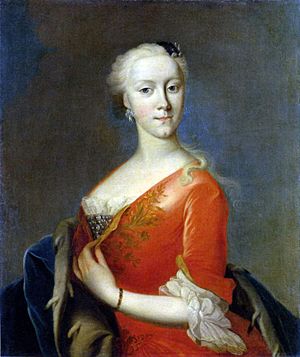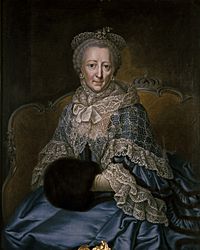Princess Philippine Charlotte of Prussia facts for kids
Quick facts for kids Philippine Charlotte of Prussia |
|
|---|---|

Portrait by Francesco Carlo Rusca
|
|
| Duchess consort of Brunswick-Wolfenbüttel | |
| Tenure | 2 September 1735 – 26 March 1780 |
| Born | 13 March 1716 Stadtschloss, Berlin |
| Died | 17 February 1801 (aged 84) Brunswick |
| Spouse | Charles I, Duke of Brunswick-Wolfenbüttel |
| Issue | Charles II, Duke of Brunswick-Wolfenbüttel Prince Georg Franz Sophie, Margravine of Brandenburg-Bayreuth Prince Christian Ludwig Anna, Duchess of Saxe-Weimar-Eisenach Prince Frederick Augustus Prince Albrecht Heinrich Princess Louise Prince Wilhelm Adolf Elisabeth Christine, Crown Princess of Prussia Princess Friederike Augusta Dorothea, Abbess of Gandersheim Prince Maximilian Julius Leopold |
| House | Hohenzollern |
| Father | Frederick William I of Prussia |
| Mother | Sophia Dorothea of Hanover |
Princess Philippine Charlotte of Prussia was born on March 13, 1716, in Berlin. She passed away on February 17, 1801, in Brunswick. She became the Duchess of Brunswick-Wolfenbüttel when she married Duke Charles I.
Philippine Charlotte was known as a very smart and educated person in Germany during her time. She is even listed as a female composer because people believe she wrote marches and other music.
Contents
Her Life as a Princess and Duchess
Philippine Charlotte was the fourth child of King Frederick William I of Prussia and Queen Sophia Dorothea of Hanover.
Marriage and Family Connections
On July 2, 1733, in Berlin, Princess Philippine Charlotte married Duke Charles of Brunswick-Wolfenbüttel. He was the oldest son of Ferdinand Albert II, Duke of Brunswick-Wolfenbüttel.
When Charles's father died in 1735, Charles became the Duke. This made Philippine Charlotte the Duchess. Her brother, Frederick, also married Charles's sister, Elisabeth Christine. These two marriages created a strong bond between the important royal families of Prussia and Brunswick.
This family connection was very important. It led to Brunswick and Prussia working together during the Seven Years' War. It also meant that Philippine Charlotte's sons could have important careers serving Prussia.
An Intellectual Duchess
Philippine Charlotte was described as a very clever and highly educated person. She was a true "child of the Enlightenment." This was a time when people focused on reason, science, and new ideas.
She even wrote her own summary of the philosophical writings of Christian von Wolff in French. The Duchess was very interested in German intellectual life. She admired the poet Salomon Gessner and was friends with Friedrich Gottlieb Klopstock. The famous writer Lessing was also part of her close group.
As Duchess, Philippine Charlotte made her court a place for learning. She held special gatherings before and after dinner. Scholars and writers were invited to these meetings. The Brunswick court also enjoyed some opera shows and public balls each year. However, her husband's spending meant they soon had to live a more economical life.
She made sure her son Charles was raised to respect her brother, Frederick of Prussia. She gave him a humanist education, meaning he learned about many different subjects. She even sent him on a "Grand Tour" of Europe with the archaeologist Winckelmann.
In 1773, her husband Charles I had to let their son become the ruler. When Charles I died in 1780, their son officially took over as Duke.
Later Life and Legacy
In 1799, the Swedish Princess Hedwig Elizabeth Charlotte visited Philippine Charlotte. She described her as "an agreeable, highly educated and well respected lady." However, by then, Philippine Charlotte was very old and had almost lost her memory.
Philippine Charlotte had her own collection of 4,000 books. She left this amazing collection to the Wolfenbüttel Library.
Her Children
| Issue | |||
|---|---|---|---|
| Name | Portrait | Lifespan | Notes |
| Charles II Duke of Brunswick-Wolfenbüttel |
 |
9 October 1735- 16 October 1806 |
Married Princess Augusta of Great Britain, had children |
| Georg Franz |
29 September 1736- 10 December 1737 |
Died as a baby | |
| Sophie Caroline Marie Margravine of Brandenburg-Bayreuth |
 |
7 October 1737- 21 December 1817 |
Married Frederick, Margrave of Brandenburg-Bayreuth, had no children |
| Christian Ludwig |
13 November 1738- 12 April 1742 |
Died as a young child | |
| Anna Amalia Duchess of Saxe-Weimar and Eisenach |
 |
24 October 1739- 10 April 1807 |
Married Ernest Augustus II, Duke of Saxe-Weimar-Eisenach, had children |
| Frederick Augustus |
 |
29 October 1740- 8 October 1805 |
Married Princess Friederike Sophie Charlotte Auguste of Württemberg-Oels, had no children |
| Albrecht Heinrich |
26 February 1742- 8 August 1761 |
Died without marrying | |
| Luise |
18 December 1743- 22 February 1744 |
Died as a baby | |
| Wilhelm Adolf |
18 May 1745- 24 August 1770 |
Died without marrying | |
| Elisabeth Christine Crown Princess of Prussia |
 |
8 November 1746- 18 February 1840 |
Married Frederick William, Crown Prince of Prussia, had children. Their marriage ended in 1769. |
| Friederike |
8 April 1748- 22 January 1758 |
Died as a young child | |
| Augusta Dorothea Abbess of Gandersheim |
 |
2 October 1749- 10 March 1810 |
|
| Maximilian Julius Leopold |
 |
11 October 1752- 24 April 1785 |
Died without marrying |
See also
 In Spanish: Filipina Carlota de Prusia para niños
In Spanish: Filipina Carlota de Prusia para niños
 | Isaac Myers |
 | D. Hamilton Jackson |
 | A. Philip Randolph |


